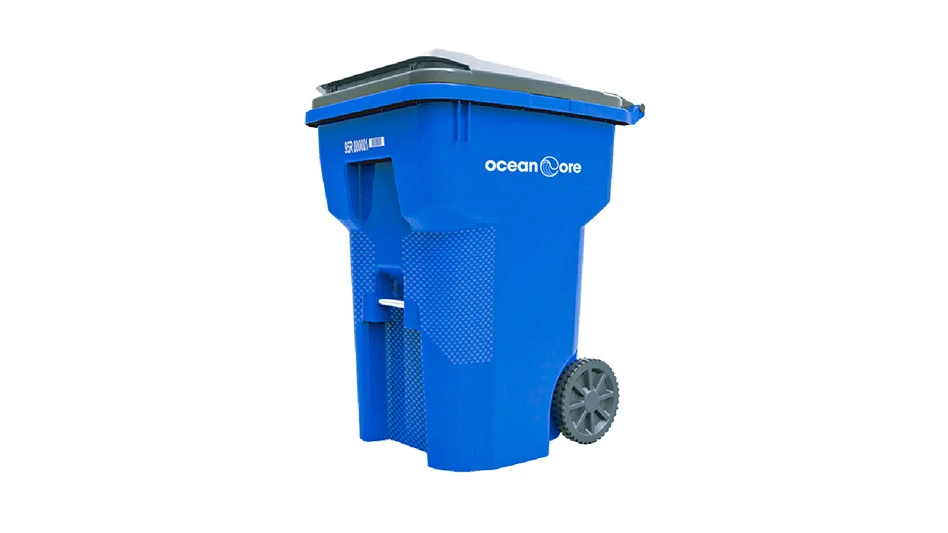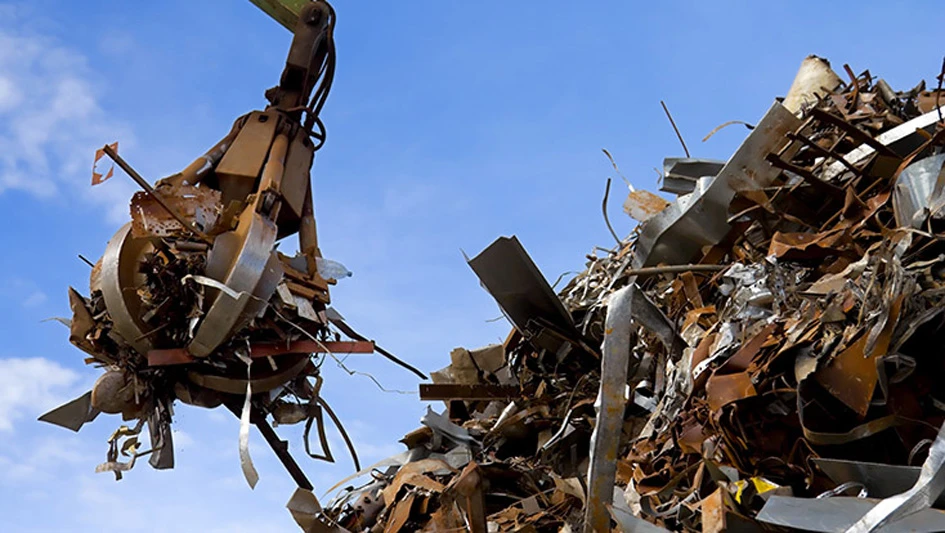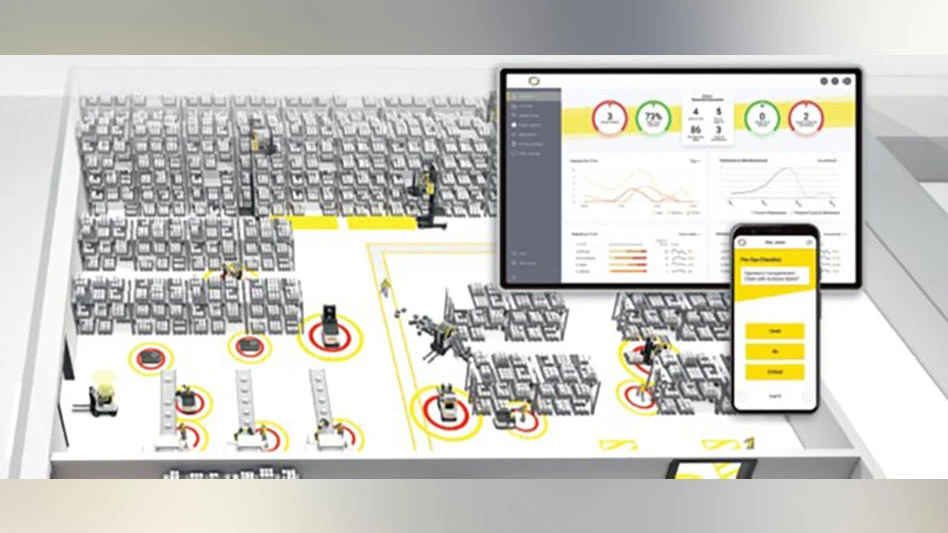
Photo courtesy of Rehrig Pacific

Over the past 110 years, Los Angeles-based Rehrig Pacific Co. has grown its business by developing a variety of products, including battery boxes, milk crates, trays, recycling bins, roll-out carts and pallets. But a constant that has remained throughout the company’s history is the goal to provide customers with long-lasting, durable and recyclable products.
Many products Rehrig Pacific produces feature recycled content, with some featuring as much as 90 percent.
“Pretty much all of our products contain some kind of recycled material, assuming the color and technical requirements are able to handle recycled material,” says Mike Riola, senior manager of national recycling at Rehrig Pacific. He says the company uses postconsumer resin (PCR) in its products, as well as some postindustrial and postcommercial scrap. About 75 percent of the recycled content Rehrig Pacific uses is high-density polyethylene, with polypropylene comprising the remaining 25 percent.
The amount of recycled content varies between Rehrig products, but the average amount is 14.5 percent—up from 11 percent in 2020. “In general, the types of recycled material we use were more readily and economically available in 2021, and we were able to leverage this with our seven manufacturing facilities and the many different products that we manufacture,” says Jonathan North, vice president of sustainable and core solutions.
While Rehrig Pacific doesn’t have a set target in mind for increasing the percentage of recycled content it uses, North says the company always aims to offer its customers “the most sustainable and circular products possible.”
“Using recycled material is one way to achieve this, but it is not the only way,” North says. “We will continue to optimize other attributes, such as product design and performance, in order to produce increasingly sustainable products.”
“Certainly, using recycled material is one way to achieve [sustainability], but it is not the only way.” – Jonathan North, vice president of sustainable solutions, Rehrig Pacific Co.
Leveraging recycled content
Rehrig Pacific introduced PCR into its products more than two decades ago through a project with the city of Los Angeles and Brigham Young University, discovering its products were improved by the use of recycled content.
“We … discovered we could actually produce a better-quality part with some recycled content,” Riola says. “We started out by evaluating the use of PCR at fairly modest levels, which enabled us to understand the potential impact that alternate materials could have on our manufacturing process or on the finished product.”
Rehrig Pacific recently developed a process called co-injection that allows it to incorporate large amounts of recycled content in its roll-out cart products without compromising their performance or appearance. With co-injection, a core of recycled content is injected into the middle of the cart and wrapped in a skin of colored virgin material.
“We’ve developed some proprietary technology in injection molding that allows us to inject recycled material into a product but not affect the color of the product,” North says. “We’re able to do that [at] relatively high rates of incorporation. The recycled material ends up being a dirty gray or black color when it’s commingled, but it doesn’t affect the finished color of the product because we sandwich it between the virgin material. That’s allowed us to really move forward with high levels of material, offering a sustainable product that still looks super good to our customers.”
In the fall of 2020, Rehrig Pacific introduced its EnviroCore roll-out cart made with 40 percent PCR, including 10 percent bulky rigid materials.
The company also has started to incorporate ocean-bound plastic into some of its products. Its OceanCore roll-out carts feature up to 40 percent PCR, including 10 percent ocean-bound plastics, and Rehrig Pacific offers roll-out carts with OceanCore in 65- and 95-gallon models.
In 2021, Boston became the first city in the U.S. to use the OceanCore carts, with plans to roll out 10,000 carts citywide over the next few years.
According to a statement, the Boston Public Works Department is introducing the OceanCore carts to residents who have broken or damaged carts in need of replacement.
“Launching the OceanCore carts with the city of Boston was doubly satisfying,” North says. “The use of ocean plastic was particularly meaningful to Boston, a city whose history is deeply connected to the ocean. Launching the initiative on Earth Day 2021 brought even more attention to the importance of providing more sustainable solutions to our customers.”
In addition to featuring recycled content, Rehrig Pacific’s roll-out carts are recyclable. The cart body, lid, wheels and axle all can be processed and used again in manufacturing, and many of the company’s durable and reusable packaging products also are recyclable.
Riola says the company will receive about 30 million pounds of material in customer returns, with the balance of its PCR coming from other sources, including curbside, postindustrial and postcommercial materials.
“Any plastic product we produce, we offer to buy it back at the end of its useful life and recycle that and get it back into our products,” says Erika Daley, director of environment, health, safety and sustainability at Rehrig Pacific. She continues, “That’s really the truest example of the circular economy—it’s taking an old recycling bin and making a new recycling bin with it, and that’s exactly what we do whenever we get those assets back.”

Sustainability considerations
Although Rehrig Pacific has been increasing its use of PCR over the last two decades, using recycled content comes with some challenges.
Finding PCR with the right properties and at adequate volumes to meet demand can prove to be challenging. Riola says strength, stiffness and moldability all are important attributes to consider. The company tests the PCR it receives in a polymer testing lab in De Soto, Kansas, to ensure the recycled content meets its standards.
“Everything we make is durable, long-lasting and 100 percent recyclable,” North says. “It’s essential for us to make sure that any of these alternate sources of material do not compromise the performance of the finished product.”
To ensure it has the recycled content it needs, Rehrig Pacific has developed relationships with more than 100 recyclers across the U.S. These core suppliers also help with its closed-loop reclamation programs, and maintaining those relationships helps Rehrig procure material as needed.
Additionally, customers don’t always want to pay more for products with recycled content, and, recently, high-quality PCR has at times cost more than virgin materials, North says. Even though developing sustainable products sometimes comes with a higher price tag, Rehrig Pacific plans to remain focused on producing them because sustainability is at the heart of its business strategy. In addition to sustainable product design, the company helps its customers solve sustainability challenges.
Rehrig Pacific also is conducting a life cycle assessment of its products to quantify their environmental impact. The company plans to use that information to optimize and improve its products by selecting better raw materials and improving product design and durability.
North says, “Overall, our goal is to lower the environmental impact of our products and enable our customers to move their goods, resources and ideas in the most sustainable way possible.”

Explore the January 2023 Issue
Check out more from this issue and find your next story to read.
Latest from Recycling Today
- Gerhard Lang Recycling partners with Tomra Recycling in aluminum alloy sorting project
- International Paper announces facility closures
- BCI briefing for legislators focuses on aiding domestic battery manufacturers
- Smurfit Westrock highlights ‘strong’ results in 6 months postmerger
- CompuCycle achieves R2V3 certification
- Battery recycler achieves industrial-scale graphite recovery
- Currents adds Midtronics' diagnostic capabilities for electrified vechicle batteries
- Grants to improve UBC capture rate at 2 MRFs






